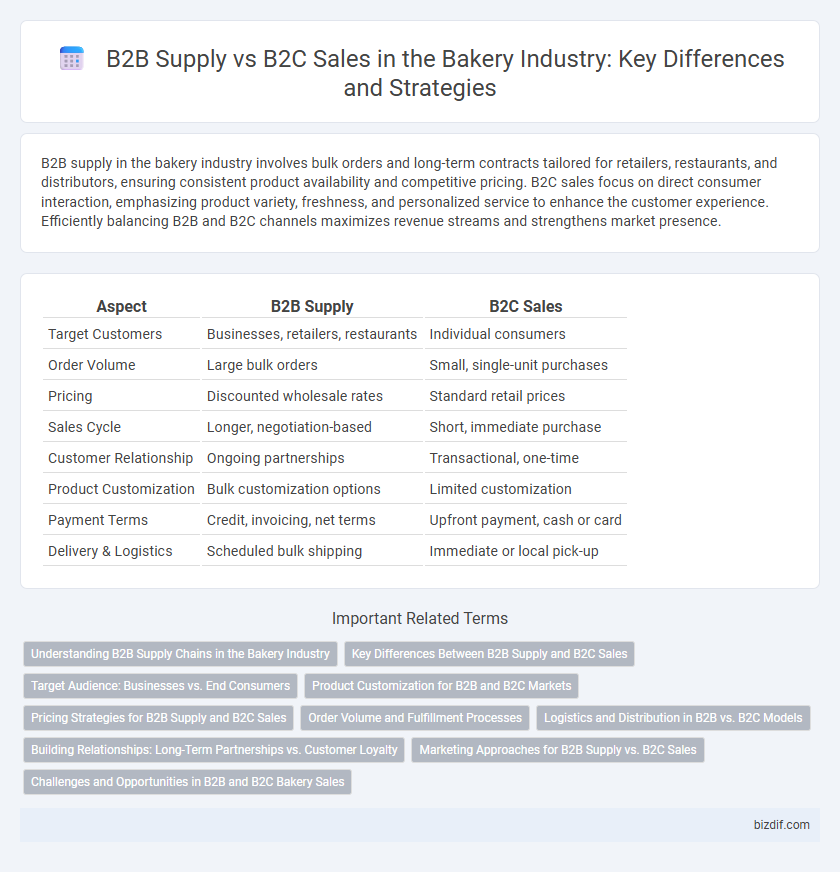B2B supply in the bakery industry involves bulk orders and long-term contracts tailored for retailers, restaurants, and distributors, ensuring consistent product availability and competitive pricing. B2C sales focus on direct consumer interaction, emphasizing product variety, freshness, and personalized service to enhance the customer experience. Efficiently balancing B2B and B2C channels maximizes revenue streams and strengthens market presence.
Table of Comparison
| Aspect | B2B Supply | B2C Sales |
|---|---|---|
| Target Customers | Businesses, retailers, restaurants | Individual consumers |
| Order Volume | Large bulk orders | Small, single-unit purchases |
| Pricing | Discounted wholesale rates | Standard retail prices |
| Sales Cycle | Longer, negotiation-based | Short, immediate purchase |
| Customer Relationship | Ongoing partnerships | Transactional, one-time |
| Product Customization | Bulk customization options | Limited customization |
| Payment Terms | Credit, invoicing, net terms | Upfront payment, cash or card |
| Delivery & Logistics | Scheduled bulk shipping | Immediate or local pick-up |
Understanding B2B Supply Chains in the Bakery Industry
B2B supply chains in the bakery industry involve sourcing bulk ingredients like flour, yeast, and sugar directly from wholesalers and manufacturers, ensuring consistent quality and cost efficiency. These supply chains emphasize long-term contracts, reliable logistics, and inventory management to meet large-scale production demands for bakeries supplying cafes, restaurants, and retailers. Understanding supplier relationships, lead times, and quality control is critical for maintaining product consistency and optimizing operational costs in bakery B2B supply chains.
Key Differences Between B2B Supply and B2C Sales
B2B supply in the bakery industry involves bulk orders, longer sales cycles, and customized pricing tailored to wholesale clients like retailers or foodservice providers. B2C sales focus on direct consumer engagement with smaller, frequent purchases and standardized pricing for individual customers seeking fresh bakery products. The distinct channels require different marketing strategies, inventory management, and customer relationship approaches to maximize efficiency and profitability.
Target Audience: Businesses vs. End Consumers
B2B bakery supply targets businesses such as restaurants, cafes, and grocery stores that require bulk orders and consistent quality for resale or use in food preparation. B2C bakery sales focus on end consumers seeking fresh, ready-to-eat products with an emphasis on convenience and variety. Understanding these distinct target audiences helps bakeries tailor their marketing, packaging, and product offerings to meet different purchasing behaviors and volume demands.
Product Customization for B2B and B2C Markets
B2B bakery supply emphasizes product customization to meet specific client requirements such as bulk order size, ingredient specifications, and packaging preferences, enabling businesses to maintain brand consistency and operational efficiency. In contrast, B2C bakery sales focus on personalized product options like flavor variety, portion sizes, and packaging aesthetics to appeal directly to individual consumer tastes and preferences. Tailoring products for B2B clients often involves scalable customization capabilities, while B2C customization prioritizes unique, small-batch creations that enhance customer experience and satisfaction.
Pricing Strategies for B2B Supply and B2C Sales
Pricing strategies in the bakery industry differ significantly between B2B supply and B2C sales, with B2B often involving bulk discounts, contract-based pricing, and customized offers to accommodate large volume orders from cafes, restaurants, or retailers. In contrast, B2C pricing focuses on competitive retail pricing, psychological pricing tactics, and promotional discounts designed to attract individual customers and drive foot traffic. Effective segmentation and cost analysis are critical to balancing profitability and customer satisfaction in both B2B and B2C channels.
Order Volume and Fulfillment Processes
B2B bakery supply typically involves larger order volumes with bulk packaging and scheduled deliveries tailored to retail or foodservice businesses, requiring streamlined fulfillment processes to manage inventory and ensure timely shipments. In contrast, B2C bakery sales focus on smaller, frequent orders with individual packaging, prioritizing fast fulfillment to maximize customer satisfaction and accommodate variable demand patterns. Efficient order management systems are essential in both models to balance production capacity and minimize waste.
Logistics and Distribution in B2B vs. B2C Models
B2B supply in the bakery industry demands optimized logistics and distribution networks to handle bulk orders, ensuring timely delivery to retailers, restaurants, and cafes. In contrast, B2C sales emphasize last-mile delivery efficiency and inventory management to meet individual customer expectations for freshness and convenience. Warehousing strategies in B2B prioritize volume storage and periodic restocking, while B2C logistics focus on rapid turnover and small batch handling.
Building Relationships: Long-Term Partnerships vs. Customer Loyalty
B2B supply in the bakery industry emphasizes building long-term partnerships through consistent quality, reliability, and customized solutions that meet business clients' operational needs. B2C sales prioritize fostering customer loyalty by offering personalized experiences, fresh products, and responsive service that encourage repeat purchases and brand affinity. Both approaches rely on trust and value, but B2B relationships focus on strategic collaboration while B2C centers on emotional connection and satisfaction.
Marketing Approaches for B2B Supply vs. B2C Sales
Marketing approaches for B2B supply in the bakery industry prioritize building long-term relationships, emphasizing product quality, consistency, and bulk pricing to attract retailers, cafes, and foodservice providers. In contrast, B2C sales focus on brand storytelling, visual appeal, and emotional engagement through social media campaigns, promotions, and packaging that highlight freshness and artisanal qualities. B2B marketing leverages trade shows and direct sales teams, while B2C relies heavily on digital marketing, influencer partnerships, and in-store experiences to drive consumer demand.
Challenges and Opportunities in B2B and B2C Bakery Sales
B2B bakery supply chains face challenges such as bulk order management, complex logistics, and maintaining consistent product quality to meet diverse client requirements like restaurants and cafes. In contrast, B2C bakery sales emphasize direct customer engagement, personalized experiences, and real-time inventory adaptation to rapidly changing consumer preferences. Opportunities in B2B include long-term contracts and steady revenue streams, while B2C benefits from brand loyalty, social media marketing, and immediate feedback for product innovation.
B2B Supply vs B2C Sales Infographic

 bizdif.com
bizdif.com